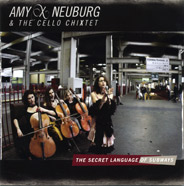Amy X Neuburg
The Secret Language Of Subways
(MinMax Music)
It's
funny to notice that five years have already passed since the release of
Residue, the album where Amy X Neuburg reached her definitive artistic
maturation, it also being the pinnacle of her mastery in organizing all
materials in her "solo" dimension following the split of the
eclectic line-up called Amy X Neuburg & Men. And while it's certainly
true that
"eclectic" has always been Amy X Neuburg's middle name, Residue
appeared to shift the focus of her artistry towards a more "serious"
compositional tone. Sure, there were still those light, ironic moments that
in some ways had been the quintessence of the artistic dimension of her old
line-up (but definitely not the whole story), but here the composer's main
focus appeared to deal with more "serious" preoccupations.
In the course of an interview we did a few weeks after the album was released,
Amy X Neuburg told me: "My next big project will be a large-scale
theatrical work (and CD) of songs inspired by New York, for voice and electronics
plus three cellists. This may take a couple of years to produce".
The CD titled The Secret Language Of Subways features Amy X Neuburg and
The Cello ChiXtet: three musicians who (very obviously) possess enormous
technical skills, also a wide background of musical experiences: Jessica
Ivry, Elaine Kreston, and Elizabeth Vandervennet. As per her usual, Neuburg
is on drums, percussion, electronics, treatments, and vocals. The album
liner notes tell of a "song cycle" which when performed live
sees all treatments and layering being performed in real time.
I think that after many listening sessions I can safely say that The Secret Language Of Subways is a great work: complex,
but not "difficult"; eclectic, but guided by a sure hand and
an impeccable logic; "post-modern" (when it comes to language),
but never reticent when it comes to expressing judgment or choosing a side.
Different languages are used, but the performing skills are more then enough
to make the material sound right. As usual with Neuburg, we have a complex
(verbal) narrative, which definitely avoids any easy interpretation while
at the same time being in a rich, complex relationship with music. Nice
recorded sound, which invites the listener to turn up the volume without
any fears of distortion and ear fatigue.
So, is everything OK? Well, here I have a little caveat for readers:
the more "rock music" (also when it comes to timbre) is one's
favourite language, the more The Secret Language Of Subways could (potentially)
be an album that one has to approach with a certain degree of caution.
Those who have never heard of Neuburg are invited to listen to Residue
first.
One
Lie opens with a meditative tone (curiously, the first five vocal notes
of this track travel in parallel with those that opened Finally Black,
on Residue), over ambient sounds, then the cellos, the mood of the track
turning from intimate to agitated. The Closing Doors has a minimalistic-flavoured
cello ostinato (left channel), then another cello, the third cello playing
unison with the voice; there's a definite "filmic" atmosphere,
and sudden tempo shifts. Difficult starts with a hypnotic bass synth sequence,
followed by cellos, its percussive hits taking us back to the Men period;
a very beautiful final air has a voice/cello unison. Tongues is a successful "structured
improvisation": it starts as a "drone" for cellos and keyboards,
then a "noisy" development, and a gloomy coda. Someone Else's
Sleep is for this writer the best moment on the album: there's a percussive
cadenza/ostinato that brings us back to the Men period, a nice melodic
development (and the word
"Lovers" sounding like a splice off a track by Joni Mitchell!),
and a fantastic "bridge" which reminded me in some ways of (Neuburg's
friend and colleague) Emily Bezar; nice close for voice and cello.
It's
at this point that the album seems to perform a detour. The Gooseneck is
a brief, light, track. This Loud opens with a piano ostinato which to me
sounded quite a lot Beatle-like, and not too far from some 60s musical
comedy (best I can do).
The
album's second part didn't appeal to me as much as the first did. I was
not too terribly impressed by Be Careful (Kurt Weill?) and Dada Exhibit:
I think they will obviously sound OK when listened to once, on a stage;
but having them on repeat in the privacy of one's home makes the joke (if
that's what it is) grow very thin.
However,
the second part offers three pearls. Body Parts moves a lot, has a
"rock" instrumentation, and verbal rhythms not too far from rap,
with gunfire as a side-dish. Hey is in a surprising, "folk"-flavoured ¾;
even more surprisingly, vocals and phrasing here definitely reminded me of
Ani DiFranco; there's also a fine jig-flavoured instrumental interlude. Shrapnel
is the excellent closing track, a great song with multiple vocals.
Almost
like an encore, there's a cover of an old Genesis track, Back In NYC, of
which I have no real memory.
Beppe Colli
© Beppe Colli 2009
CloudsandClocks.net | Sept. 13, 2009











